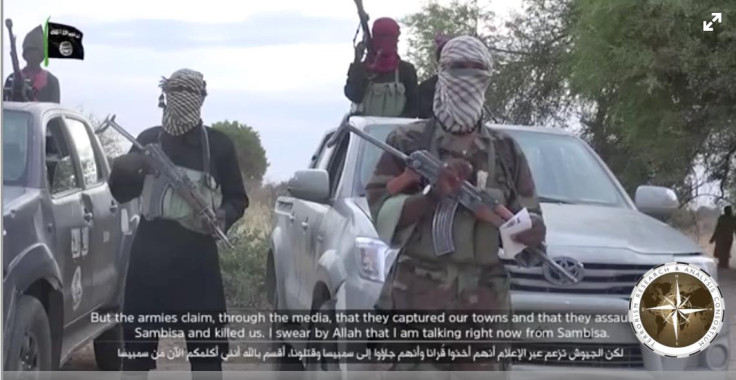Nigeria: Boko Haram kills 37 in latest attack in Borno

Terror group Boko Haram has killed 37 people in recent raids in several villages in Borno state.
Witnesses told The Leadership newspaper that the terrorists burned down hundreds of houses by hurling petrol bombs at them.
The attacks occurred in the Koshifa, Matangale, Buraltuma, Darmanti, Almeri and Burmar villages in the Damboa government area.
Who are Nigeria's Boko Haram terrorists?
Boko Haram fights against Western influence in Nigeria and aims to impose its version of Sharia law on the country. The group declared an Islamic caliphate in Gwoza, along the Cameroon border, in August 2014.
Boko Haram has raided several cities in the north of the country in a bid to take control of more land.
Three states − Adamawa, Borno and Yobe − have been under a state of emergency since May 2013, due to Boko Haram's attacks.
The group has killed at least 2,600 people since the beginning of 2015. More than 180 have been killed since the beginning of June.
A member of the youth vigilante, Civilian-JTF, Ahmed Ajimi, who managed to flee to another village, said: "What we saw in the villages was really horrifying.
"Unlike before when they would gather people and open fire on them, the terrorists this time round, announced their arrival with sporadic shootings and throwing of what looked like petrol bombs on houses, which resulted in several burnt houses."
Boko Haram (recently renamed Iswap) has killed hundreds of people in the restive Borno state in recent days, after newly elected President Muhammadu Buhari announced the relocation of military headquarters from Abuja to Maiduguri, capital of Borno.
The militants also released a video in which they denied the government's claim that the army had recaptured some territories previously occupied by the insurgents. Shortly after the video, suspected Boko Haram members carried out a bomb attack in Yola, killing at least 31 people.
Buhari met with regional leaders on Thursday (11 June) to discuss future military strategies.
He said during the meeting that Nigeria should lead the anti-terror joint offensive and that a proposed six-month rotating command among the five nations could disrupt operations.
Nigeria
Capital: Abuja
Population: 174,507,53 (2013 census)
Largest cities: Lagos, Kano, Abuja
Major ethnic groups: 21% Yoruba, 21% Hausa,
18% Igbo
Languages: English, Hausa, Igbo, Yoruba
Religion: 50% Muslim, 40% Christian, 10% other
Currency: Naira (N) 1N = £0.0033; US$0.0050
Buhari was quoted by AFP as saying: "Six months duration as it is being proposed... does not augur well for effectiveness and efficiency. Such a process will undermine, even if it is not intended, the military capacity to sustain the push against the insurgents, who also have the uncanny ability to adapt and rejig their operational strategies.
"I'm inclined on account of the above to suggest to your excellencies... that Nigeria retains the position of the field commander of the MNJTF [Multi-National Joint Task Force] for the period of the war effort."
Earlier in June, Buhari announced that Nigerian military headquarters were to be relocated from the capital Abuja to Maiduguri. The leader said the headquarters will stay in Maiduguri until the fight against the terrorists is over.
More about Nigeria
Colonisation
Between 1790 and 1807, Britain acquired an estimated 2000 slaves per year from Lagos, Nigeria's largest city. In 1807, Britain stopped the practice after the implementation of the Slave Trade Act and annexed Lagos in 1861 after it bombarded the town deposing leader Oba Kosoko - who supported the slave trade - and helped install Oba Akitoye.
Independence
Britain officially occupied Nigeria from 1885 until 1960, when the country gained independence.
Biafra and civil war
Tensions due to political differences among Nigeria's main ethnic groups – the Hausa, Igbo, and Yoruba - as well as perceived corruption in the political and electoral process culminated with several coups d'etat, which further ignited tensions between the north and south of the country. The situation further worsened when the then Eastern Region declared independence from the rest of Nigeria and proclaimed the Republic of Biafra in 1967. A civil war ensued when the Nigerian army invaded Biafra in 1967. The 30-month conflict resulted in the death of between 1 and 3 million people and the end of the Republic of Biafra. Hundreds of thousands of people died of starvation as a result of restrictions on Red Cross aid and food supplies to Biafra imposed by the Nigerian government.
Terrorism
Ethnic tensions between Christians and Muslims in the country started during the colonisation era, when the British promoted the spread of Christianity in the Bornu Empire - modern day northeast Nigeria - ruled according to the principles of the Constitution of Medina, believed to have been drafted by the prophet Mohammed. Violence increased when the Muslim sect Yan Tatsine instigated deadly riots in Kano state. As a result, the sect leader was killed and violence spread across other cities in the northeast.
In 2002 Mohammed Yusuf founded Boko Haram - translated from the Hausa language as "Western education is forbidden" - attracting unemployed poor Muslims with his rhetoric focusing on the country's widespread corruption. Boko haram is still active today and aims to establish an Islamic Caliphate in northern Nigeria where he fights against Western influence and aims to impose its version of Sharia law.
© Copyright IBTimes 2025. All rights reserved.






















